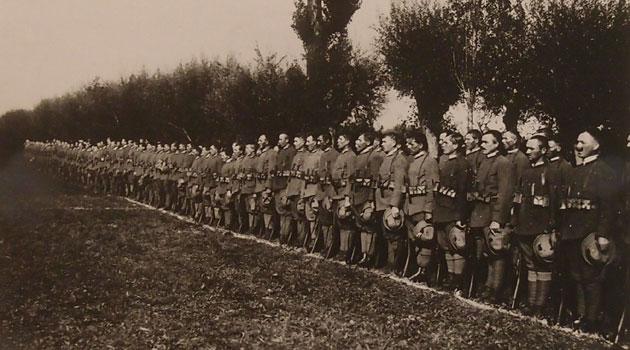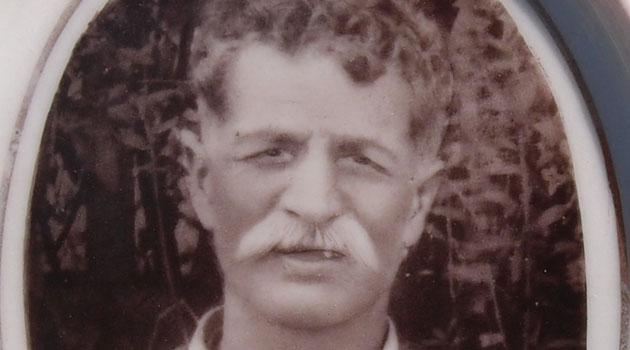How were Romani members of the Czechoslovak Legionnaires rewarded for their service?

On the occasion of the 100th anniversary of the founding of the Czechoslovak republic, events and movements are being commemorated that contributed to that watershed moment. Commemorations of the credit due to the Czechoslovak Legionnaires are being heard from all quarters.
Romano vod’i magazine has previously published about the Romani members of the tens of thousands of Czechoslovak Legionnaires who fought in those days. Now I am returning to this subject from a different perspective.
Here I am asking how the Roma who entered the Czechoslovak Voluntary Forces (which was the original name of the Legions) during the First World War were later appreciated for their service? Did they receive any honors for participating in battle?
Did their fellow legionnaires appreciate the fact that they had Romani fighters among them (who at the time were called Gypsies)? I found answers to these questions sporadically in the personnel files of Romani legionnaires archived at the Military History Institute in Prague (VHÚ).
So far I have managed to identify 10 Romani legionnaires from Bohemia and Moravia, but this number, of course, is certainly not complete. Another, maybe even larger, group could have apparently been created by Romani legionnaires from Slovakia, but here in the Czech Republic, due to a lack of knowledge, they are not focused on as much.
First I will discuss what kind of appreciation was given to the legionnaires of Romani origin whom I have discovered and what kind of assessments they managed to achieve of their contributions. For some of them it is recorded that they never attended formal education, so it can be assumed they did not know how to read and write.
In order to advance in rank, literacy was certainly a condition, which means just some of them were able to attain a higher rank. A certain promotion was achieved, for example, by Herman Daniel, who worked his way up from being an infantryman to a shooter with the 11th Mounted Regiment in the Russian Legions and then a cavalryman with the Second Czechoslovak Mounted Regiment – the so-called Siberian Regiment.
More Romani soldiers made it into the Mounted Regiments – maybe thanks to the fact that they were close to horses due to their professions as blacksmiths or horse wranglers. That was also the case of Štěpán Holomek of Kunovice, a legionnaire from the Italian division, who was attached “to the carriages”.
Štěpán Daniel of Svatobořice and Antonín Daniel of Kněžpole also achieved the rank of shooter of the first regiment in the Russian Legions (the “Master Jan Hus Regiment”), although after one year with the Legions on the Russian Front Anton deserted and was therefore discharged. Antonín Holomek of Derfle (today called Sady u Uherského Hradiště) was first a hunter in what was still Austria-Hungary with the 25th Hunters’ Battalion, and was assigned in the Russian Legions as a shooter to an auxiliary company and reassigned to France, first to the 23rd and then to the 24th Regiment.
František Serynek, born in Hlušičky (Nový Bydžov district) was also a Czechoslovak shooter and mounted soldier, serving in the Russian Legions with the First Mounted Regiment. Jan Daniel of Petrov served as a cannoneer with the Second Division Mounted Brigade.
The highest rank of the legionnaires of Romani origin identified so far was achieved by Robert Serynek, born in 1892 in Čížkov (Blovice), who served in the Italian Legions in the 35th Regiment, Seventh Company. He did not make it into Italian captivity until August 1918, at the rank of a lance corporal, but he immediately enlisted with the Legions and on 1 May 1919 was promoted to the rank of sergeant.
Unfortunately, Robert Serynek’s apparently lengthy wartime suffering and the injuries he sustained caused a sudden illness, and on 4 June 1919 he was taken into hospital in Prague’s Karlín quarter, where he died of his illness on 10 June of that same year. While on his deathbed he was awarded the Czechoslovak Wartime Cross on 7 June.
It is also possible to discover the honors awarded to other legionnaires of Romani origin. For example, Štěpán Daniel received the Czechoslovak Revolutionary Medal in March 1920 and in May of that year received the same medal from the allies, while František Serynek is recorded as having received the Medal of Victory (in 1928).
Adolf Ištvan, registered as coming from the Romani settlement of Bohusoudov, was also honored for his participation in the Legions, achieving the rank of shooter (First Battalion 33rd Regiment of the Czechoslovak Legions) and being awarded a Revolutionary Ribbon and an Italian Ribbon for his six months in the field. Another shooter with the 33rd (but in the 7th Company), František Murka of Holešov, also received a Revolutionary Ribbon, and was also awarded with the Czechoslovak Meritorious Italian Cross, while Jan Daniel of Petrov received a Russian Cross.
In the records of these awards the Romani origins (or rather, the “Gypsy” origins, as they would have been termed then) of these soldiers is not mentioned. Basically in all of these files there are just a few hints from which to deduce their Romani origins.
If we want to confirm the Romani origins of these legionnaires, most of the time it is necessary to also study their birth records or other archival materials. A remarkable fact is that when the “Gypsy” origin is explicitly stated in the legionnaires’ files, it is usually as a neutral or even a slightly positive characteristic.
That soldiers in the Legions considered these Roma their brothers can be seen from the legionnaires’ service cards, for example. For Adolf Ištvan, in the column headed “special skills”, it is mentioned that he knows “horseback riding”, and for Štěpán Holomek that he speaks “a bit of German and Gypsy very well” (!).
Even more telling are the appreciated qualities of bravery, decisiveness, and loyalty among these Romani soliders, as their legionnaire brothers from Uherský Ostroh wrote in the letter that I previously mentioned in my other article for Romano vod’i on this topic. That letter was written after the death of legionnaire Josef Holomek in 1936 and was sent to Prague as a report for the legionnaires’ weekly.
In the periodical called Czechoslovak Legionnaire (Československý legionář), which was published three times a month, there was a regular column called “Our Peers” (Naše rovy). This was where obituaries of legionnaires were published by their family members or local legionnaire branches.
As I mentioned in my previous article, the burial of the impoverished Josef Holomek, who died of cancer, was arranged by local legionnaires. They wrote up a report on the course of the funeral for the “Our Peers” column.
Their report was published in a very condensed, edited version, leaving out their emphasis on the fraternal solidarity of legionnaires. For us what is interesting is the fact that the writer (Brother Habaň) twice mentions Holomek’s “Gypsy origin”, which in the letter is associated on the one hand with a lack of education and poverty, but on the other hand with a comprehension of the historical context of his life.
In the letter, the author criticizes those who did not join the Legions or who even dissuaded their other brothers from joining, but who are now better off than those who fought for everybody’s freedom. If we consider that the letter was written at a time of economic crisis and sent to the Ministry of National Defense, it can be perceived as criticism sent from below.
It is not surprising that these passages of the letter were not included for publication, including its mentions of the “Gypsy” origin of Holomek, as documented in the press of the time, which published a reformulated wording of this report by the Office of the Czechoslovak Legions at the Ministry of National Defense (KLEG). For comparison’s sake we can now closely read the wording of the original text, finally printed here without censorship:
“From Uherský Ostroh
On 25 August of this year [1936] Brother Josef Holomek, a shooter with the Italian Legion, died after a brief illness in Ostrožské Předměstí at the age of 60. He was born on 4. XII. 1876 in Hluk, Uherské Hradiště, and registered in Ostrožské Předměstí near Uherský Ostroh. He joined the Czechoslovak Army in Italy at the beginning of 1918 and served in the 32nd Infantry Regiment.
His funeral was held on 27 August of this year and was attended in large numbers by legionnaires from all over the area and by local residents. He died absolutely penniless and therefore the funeral was arranged by the Č.O.L. in Uherský Ostroh at their own expense. The command of the 27th Infantry Regiment in Uherské Hradiště sent an honor guard to the funeral. Official musical performers could not be arranged, but civilians provided the music. Brother Habaň paid his last respects to the deceased on behalf of the legionnaires and friends from the 32nd Regiment.
The Č.O.L. unit in Uherský Ostroh would like to hereby thank the command of the 27th Infantry Regiment in Uherské Hradiště for sending an honor guard. The local residents were surprised by the arrangement of this funeral with a military accompaniment and high participation by the legionnaires, 40 of whom assembled in uniform and 20 of whom assembled in civilian dress. It had been believed that since Brother Holomek is of Gypsy origin, absolutely penniless and nothing had been organized anywhere that there would be nobody to arrange a decent burial for him. After the funeral it was noted with satisfaction that the brotherhood of Legionnaires is genuine and makes no distinctions between those who are wealthy and those who are absolutely penniless.
For us, however, it is even more interesting that Brother Holomek, as a Gypsy!, without any education, comprehended the seriousness of those times for the Czechoslovak nation and what was happening beyond our borders, and that he voluntarily enlisted into the Czechoslovak Army, while other more educated people never grasped this to such a degree that they would have enlisted themselves, and they condemned our resistance action in Italy as a rash deed. Those people firmly believed in Austrian victory, called us traitors, and promised to hang us when we returned. Today they are pretending to be patriots, and of course they are far better off in our republic than are our brothers who returned from battle with broken health, who live in penury, and who die early. Brother Holomek, may your memory be honored for eternity.”
On behalf of Romano voďi it is appropriate to add here: Honor to the memory and lok phuvori to all of the legionnaires of Romani origin, both those known and those unknown!
First published by Romano voďi magazine.
The author would be grateful for any tips leading to the discovery of other legionnaires of Romani origin, as well as for examples of photographs from those days that families may have preserved. If you can provide additional information or memorabilia, please contact her at lada.vikova@upce.cz. Many thanks in advance.
